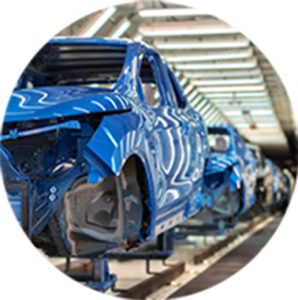APPLICATIONS & USE CASES

The ORCA PT Series has been designed specifically for near-term usability in operational data centres. ORCA has built a development environment that allows scientists and engineers to develop quantum and hybrid quantum-classical applications such as combinatorial optimisation and generative AI without the need for extensive quantum domain knowledge.
The ORCA PT Series has already been applied to a wide range of applications and use-cases. Results have been achieved with researchers and enterprises in several scientifically and industrially important use-cases. Below are some examples:

Energy
Optimise renewable energy production, response time and lower resource costs.
Energy
Optimise renewable energy production, response time and lower resource costs.
Using data from the Fukushima nuclear accident and a quantum machine learning model, Rolls Royce used a PT Series system to identify potentially hazardous situations and contribute towards their nuclear reactor research. For example, the machine learning algorithm can predict when parameters of pressure and temperature go outside of the normal scope and operate in unsafe conditions. (Learn more)
ORCA partnered with Frazer Nash, an engineering and technology consultancy, to optimise grid balancing for the National Grid Electricity Supply Operator (ESO). Grid balancing requires matching power generation to demand to prevent blackouts, but different power sources (gas, solar, wind, nuclear, etc.) vary in cost, availability and response time. Determining the optimal combination of power sources to meet demand at minimal cost is a complex optimisation challenge. Frazer Nash demonstrated that ORCA’s quantum processors could offer new solutions to this problem.(Learn more)
EY and ORCA applied generative modelling techniques on the PT Series for onshore and offshore wind farm location optimisation. The objective of the project was to assess the impact of novel algorithms that use data science and quantum computing (vs traditional techniques) to optimise the placement of wind turbines for maximum energy output and cost efficiency. (Learn more)
The UK Atomic Energy Agency looked at reducing the computational cost of modelling uncertainty propagation in a nuclear fusion reactor. Using ORCA’s PT-1 photonic quantum boson sampler, the collaboration involved developing a hybrid quantum-classical approach to prune PINN (Physics Inspired Neural Networks) connections, aiming to reduce computational resources while maintaining predictive accuracy. This collaboration applied quantum computing to complex physics simulations – something that could potentially revolutionise fusion reactor modelling and other complex physical systems analysis. (Learn more)

Chemistry
Discover new and novel molecular structures faster in biofuel discovery, material innovation and pharmaceutical development.
Chemistry
Discover new and novel molecular structures faster in biofuel discovery, material innovation and pharmaceutical development.
bp and ORCA partnered to apply quantum-powered innovations to computational chemistry. Correctly predicting the 3D shape, or conformations, of molecules is essential for biofuels, materials and pharmaceuticals, but the vast search space and high computational demands hinder traditional methods. To address this, a hybrid quantum-classical approach using generative adversarial network (GAN) algorithms was applied to generate low-energy conformations of small to medium hydrocarbons.(Learn more)

Healthcare & Life Science
Enable faster drug discovery, improve patient diagnostics and lower the operational costs of healthcare.
Healthcare & Life Science
Enable faster drug discovery, improve patient diagnostics and lower the operational costs of healthcare.
Unlocking Peptide Design with Quantum-Enhanced Generative AI
DTU, ORCA Computing, Sparrow Quantum and PSNC partnered to demonstrate the use of quantum computing and generative AI tools for the design of therapeutics with best-in-class characteristics. ORCA quantum system offers unique capabilities that improve the efficiency of generating latent spaces used in generative models. By incorporating quantum-enhanced latent spaces, quantum approaches can capture biological relationships governing peptide-MHC presentation that classical methods might miss and design peptides with a higher likelihood of triggering an immune response by being immunogenic. Notably, the quantum-guided model not only outperformed the classical approach but also learned to generate peptides more quickly. (Learn more)

Transportation & Logistics
Increase operational efficiency in production environments and logistics.
Transportation & Logistics
Increase operational efficiency in production environments and logistics.
ORCA partnered with the Port of Dover to apply a quantum optimisation algorithm aimed at enhancing operational efficiency and reducing congestion. The port manages large volumes of passenger and cargo traffic in limited space, and optimising vehicle routing could significantly cut down queues and waiting times. The problem was formulated as a Quantum Unconstrained Binary Optimisation (QUBO) problem and solved using simulations on the ORCA SDK, offering insights into minimising congestion. While the solution could have been achieved classically using a specialised solver or brute force, the Port of Dover team gained valuable experience in quantum optimisation by setting up and simulating a practical example, successfully translating complex traffic flow dynamics into the QUBO framework. (Learn more)
Bahut looked at the “Travelling Salesman problem” to minimise shipping times and costs. Results used networks of up to 48 locations in simulations, proving the capabilities of a quantum computer to solve a complex Travelling Salesman Problem. ORCA worked with the Bahut team and Digital Catapult to develop a new formulation of this problem that leveraged the flexibility of the boson sampler to reduce the size of the search space, enabling the example to run on a real quantum computer. (Learn more)
Seer developed predictions using the PT Series system to identify when a package would be delivered late. In addition, Seer created a quantum computing model aimed at improving logistics operations. This quantum variational binary classification model was designed to accurately classify container deliveries as either on time or late. This capability would allow for the processing of more features while reducing missed signals, thereby improving operational efficiency and reliability. (Learn more)

Defence
Optimise operations, enhance observational capabilities for strategic planning and leverage advanced anomaly detection.
Defence
Optimise operations, enhance observational capabilities for strategic planning and leverage advanced anomaly detection.
ORCA worked with the UK Ministry of Defence and Department for Environment, Food and Rural Affairs and RAL Space to demonstrate the applicability of applying hybrid quantum-classical generative machine learning to the infilling and improving satellite images. This capability can be applied to use cases such as removing airplane contrails from satellite images, improving sea and land surface temperature monitoring, generating super-resolution imagery from low-resolution images, forecasting near-term storm cloud trajectories and in-filling of algal bloom data.

Manufacturing
Accelerate manufacturing in the automotive and aerospace industries with a range of use cases from materials to logistics.
Manufacturing
Accelerate manufacturing in the automotive and aerospace industries with a range of use cases from materials to logistics.
Professional services company Arup partnered with ORCA to apply quantum computing applications in bridge design. Ensuring a bridge is strong enough to support its load, without over-engineering and wasting resources, is crucial. The bridge deck loading problem is a combinatorial optimisation challenge, where the goal is to find the worst-case combination of vehicle positions on a grid covering the bridge deck. Arup applied quantum computing to a bridge deflection problem. (Learn more)


Quantum Accelerated GenAI
Generative AI is impacting every industry and organisation. The combination of quantum computing and generative AI will profoundly advance machine learning capabilities while disrupting the unsustainable demand for power consumption. ORCA’s PT Series is uniquely suited to machine learning with capabilities not found in any other classical and quantum computing platform.

Combinatorial Optimisation
Combinatorial optimisation problems are encountered across several areas of significant industrial and societal importance. The PT Series is ideally suited to binary optimisation problems including the knapsack problem, travelling salesman problem and quadratic unconstrained binary optimisation (QUBO).

AI Factory
Organisations are investing in a new type of data centre, the AI Factory, which integrates high-performance computing hardware and specialised software to power, train, and deploy AI models across diverse applications, from autonomous vehicles to robotics and real-time data analytics. The PT Series is designed to work in multi-GPU, multi-QPU, and multi-user environments, bringing quantum-accelerated capabilities to the AI Factory.

High-Performance Computing
The HPC Community is already one of the first primary adopters of quantum computing. Through the benefit of conventional data centre infrastructure and industry standard software, ORCA has demonstrated the integration of the PT Series into production scientific research HPC centres enabling hybrid applications of classical and quantum computing.
RELATED ARTICLES AND REPORTS

NEWS
Quantum Enhanced Vaccine Design on the ORCA PT Series
The impact quantum-enhanced approaches could have on vaccine development.

NEWS
How quantum will enhance machine learning in finance
Our Head of Machine Learning William Clements wrote an article for Finance Derivative discussing how quantum can enhance machine learning in the financial sector.

NEWS
Global Defence Technology: Quantum leap, reaping the benefits of early adoption
Our CEO and Co-founder Richard Murray recently had an in-depth interview with Global Defence Technology magazine.

WANT TO LEARN MORE?
Interested in learning more about ORCA and how quantum can be applied to your organisation? Please get in touch.


